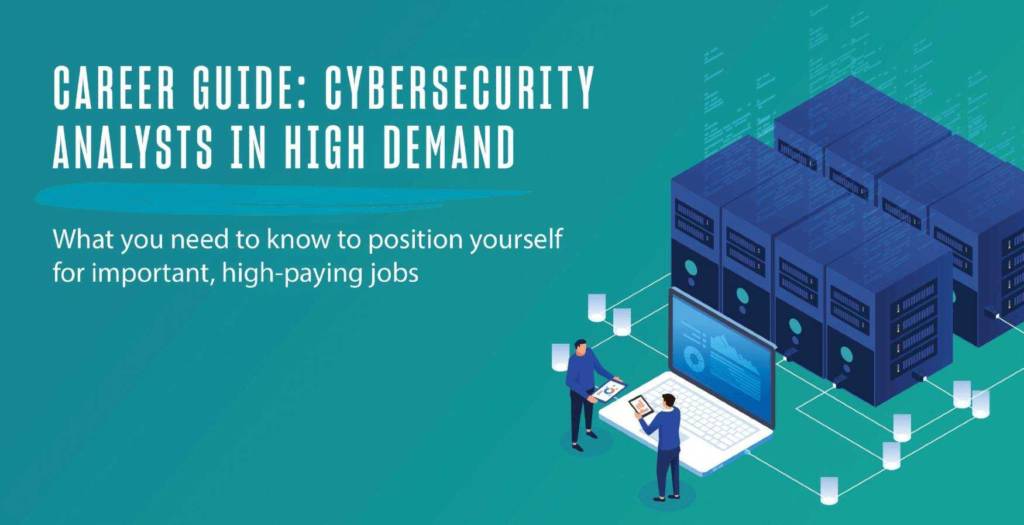Do you enjoy analyzing and breaking codes? If the answer is yes, you should consider a career as a cryptanalyst. In this career guide, we explore everything you need to know about this up-and-coming cybersecurity position, including job responsibilities, average salary, hard and soft skills required — and much more!
What Is a Cryptanalyst?
First, let’s review what this job entails. As Coursera explains, a cryptanalyst is a “professional codebreaker,” with the job title coming from the Greek words kryptós (“hidden”) and analýein (“to analyze”). In this role, a person is responsible for
“analyzing hidden messages by decoding or decrypting data, even without the encryption key.”
Common Cryptanalysis Terms
If you’re interested in cryptanalysis positions, you should familiarize yourself with three important terms:
- Plaintext — This is defined as any type of plain, readable text (messages, documents, emails, files, etc.).
- Ciphertext — This term refers to plaintext that has been transformed, either through encryption, algorithms or ciphers.
- Hashing — This refers to the process of translating a key into a different value or code.
We also recommend checking out the comprehensive Cybersecurity Glossary from the National Initiative for Cybersecurity Careers and Studies and the Glossary of Security Terms from the SANS Institute.
Cryptanalyst vs. Cryptographer vs. Cryptologist
You may have heard of cryptography or cryptology, but they are not the same as cryptanalysis. Let’s explain it all, including the difference between cryptography and cryptanalysis:
- Cryptanalysis – “The decryption and analysis of codes, ciphers or encrypted text. Cryptanalysis uses mathematical formulas to search for algorithm vulnerabilities and break into cryptography or information security systems.”
- Cryptography – “The study of conversion of plaintext (readable format) to ciphertext (non-readable format) i.e. encryption. It is also called the study of encryption.”
- Cryptology – “The study of the conversion of plaintext to ciphertext and vice versa. It is also called the study of encryption and decryption.”
To put it simply, cryptanalysis is the study of breaking codes, cryptography is the study of creating codes and cryptology is the study of both.
What Does a Cryptanalyst Do?
A cryptanalyst is a mathematically focused position centered around protecting data from those who will use it nefariously. “A cryptanalyst develops mathematical methods and codes that protect data from computer hackers,” explains CareerExplorer. “This involves the decryption of a ciphertext into plaintext in order to transmit a message over insecure channels.”
Cryptanalyst Job Description
The specifics of the job will vary depending on the position, but here are some common cryptanalyst job responsibilities, courtesy of Comparitech:
- Protect important information from interception, modification, duplication or deletion
- Evaluate, analyze and target weaknesses in cryptographic security systems and algorithms
- Design strong security systems that prevent vulnerabilities
- Develop statistical and mathematical models that allow you to analyze data and solve security issues
- Test computational models for both accuracy and reliability
- Investigate, research and test new cryptanalysis theories and applications
- Stay up to date on the latest technologies that hackers are using
- Identify, configure, implement and test the latest tools in cryptanalysis
- Develop codes or new coding methods
- Monitor and detect issues in data flow or collection
- Debug and test software programs
- Analyze and decode encrypted messages
Career Paths to Become a Cryptanalyst
In order to become a cryptanalyst, you must first obtain the right education and explore relevant certifications. It’s also important to continue to enhance your knowledge and skills (and stay up to date on the latest trends) even after you secure a position, especially since the cybersecurity world is constantly changing.
Cryptanalyst Education Requirements
In most cases, you need a minimum of a bachelor’s degree in a relevant field, such as cybersecurity, computer programming, computer science, computer engineering, software development or IT. Some employers, however, may require a master’s degree in a related subject. As CareerExplorer points out, many cryptanalysts have advanced degrees (either master’s or doctoral); this is especially important for anyone who would like to teach at the college or university level.
Certifications
Certifications are important for cybersecurity positions, including cryptanalysts. According to Comparitech, these are the most common ones for this type of position:
- EC-Council’s Certified Encryption Specialist (ECES)
- CISSP – Certified Information Systems Security Professional
- GIAC’s (Global Information Assurance Certification) GPEN certification
- CompTIA Security+
- CEH – Certified Ethical Hacker Certification
- GIAC’s (Global Information Assurance Certification) GPEN certification
- IACRB’s CPT – Certified Penetration Tester
- IACRB’s CEPT – Certified Expert Penetration Tester
- CompTIA’s PenTest+
- EC-Council’s Certified Blockchain Professional (CBP)
Hard Skills
If you’re looking to become a cryptanalyst, what types of hard skills do you need to succeed? These are the hard skills employers are typically looking for:
- Knowledge of computer programming languages
- Advanced understanding and command of math
- Knowledge of computer science
- Knowledge of encryption techniques
- Knowledge of key changes and digital systems
Soft Skills
Soft skills are sometimes just as important. Here are some of the most common ones for this type of position:
- Problem-solving skills
- Strong communication skills
- Analytical skills
- Critical thinking
- Ability to use innovative approaches and solutions
- Self-motivation
- Willingness to continually develop knowledge and skills
- Ethical integrity
Here are some other important resources to consider, which apply across all job types and industries:
- Top Soft Skills Employers Value With Examples
- Soft Skills to Help Your Career Hit the Big Time
- 10 Reasons Why Soft Skills Are Important to Employers
Common Interview Questions for a Cryptanalyst
If you’ve landed an interview for a cryptanalyst position — congratulations! Interview preparation is key, which is why we’ve compiled some common questions for this type of position from QuickStart. They include:
- How do you react to instructions and criticism?
- Which subject did you enjoy the most during school?
- What would you recommend for a company that has just experienced a cyber attack?
It’s also best to practice with a variety of both general and cyber-specific interview questions. Here are some resources to bookmark:
- Sample Cyber Security Interview Questions and Answers
- Top 50 Cyber Security Interview Questions and Answers
- Cyber Security Specialist Interview Questions (With Sample Answers)
- 50 Common Job Interview Questions and Answers
- 125 Common Interview Questions and Answers (With Tips)
- Top 10 Job Interview Questions and Best Answers
- 100 Top Interview Questions
Similar Job Roles
If you’re searching for cryptanalysis positions, you will likely come across a variety or related job titles, which include:
- Data Decoder
- Encryption Expert
- Message Decoder
- Signals Analyst
How Much Do Cryptanalysts Make?
There are many factors that will impact your salary, including the geographic location of the job itself, the industry and your experience and education. Here are some average salary ranges for cryptanalyst positions:
Please note that these salaries are often updated in real time and may change daily.
- Average salary of $77,494 – Economic Research Institute
- National average of $51,826 (with a high of $122,000) – ZipRecruiter
- 2019 average for a cryptanalyst in the federal government was $129,413 — FederalPay.org
- U.S. average is $76,761 — Comparably
Career Outlook for a Cryptanalyst
In general, the outlook for all types of cybersecurity positions is extremely favorable. As Cybersecurity Guide explains:
“The worldwide staffing shortage in the cybersecurity industry is well documented, and cryptanalysis is no different. There is a certain spy world attraction to being a cryptanalyst that constantly brings new mathematicians and computer scientists into the field. But the constant evolution and advancement in computer sciences, the rapid expansion of digital techniques used in law enforcement and espionage is creating new demand for cryptanalysts. And this is likely to continue for the foreseeable future.”
Companies Hiring Cryptanalysts
Cryptanalyst jobs are very specific positions, so you may have an easier time finding these types of jobs by searching for cryptanalysis or related cybersecurity words.A recent search on LinkedIn revealed that the following companies recently posted for these types of positions:
- National Security Agency (NSA)
- Robinhood
- Fayetteville State University
- Virginia Tech
- Microsoft
- Leidos
- CACI International, Inc.
- Northrop Grumman
Though cryptanalysis and cryptology are different, you may find interesting open positions through the International Association of Cryptologic Research.
USAJOBS is also a good resource for open positions within the federal government.
Frequently Asked Questions
Reach Your Goal of Becoming a Cryptanalyst with an Advanced Degree
If you’re considering a career as a cryptanalyst, consider furthering your education with the University of San Diego — a highly regarded industry thought leader and education provider that offers two advanced degrees in cybersecurity taught by expert instructors who share insights drawn from relevant industry experience.
The 100% online Master of Science in Cyber Security Operations and Leadership program is designed for career-focused professionals who are interested in gaining a deeper understanding of cybersecurity concepts, topics and theories, along with leadership skills. Students will gain specific knowledge and skills in the areas of technology, law, policy, compliance, governance, intelligence, incident response and management.
USD’s Master of Science in Cyber Security Engineering has been designated as a National Center of Academic Excellence in Cybersecurity. Each CAE-designated program equips students with the necessary skills, knowledge and tools to succeed in cybersecurity.
USD’s Master of Science in Cyber Security Engineering, which is offered both on-campus and online, is ideal for recent graduates and skilled professionals with an engineering background who are currently working in a wide range of cybersecurity roles or aspiring to work as a security engineer. Students will learn about digital and network forensics, the technical considerations for incident response and continuity planning and much more.
If you have any questions — or you’d like to learn more about which program may be the right fit for your cybersecurity career — contact a USD enrollment advisor today.




![Preview image of How to Become a Cybercrime Investigator [+ Salary & Career Guide]](https://onlinedegrees.sandiego.edu/wp-content/uploads/2022/03/Guide-Cybercrime-Investigator-1024x537.jpg)
